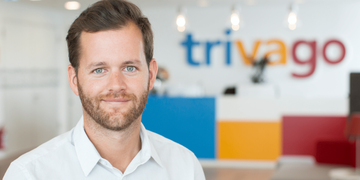
Victor Vermersch (trivago): “There’s no place for randomness in anything we do”
In the eyes of potential customers, trivago is the winner of the WUA online orientation study on booking a hotel for a night in the Netherlands. The research was done in June 2017, consumers orientated themselves on smartphone (n=200). In this interview, we talk to Victor Vermersch, Head of FR-Benelux at trivago. A talk about cultural diversity as a business success factor, never ever working on gut feeling, work-life balance, AI, and personalization.
Victor Vermersch, congratulations on winning this WUA study. How important is it for you to be the best in the digital arena? What role does having a winning mentality play in this?
“It is really satisfying to get this kind of reward, especially in a competitive field such as the hotel industry. Being recognized as one of the very best websites for searching a hotel room is a major achievement. This really motivates us, it pushes us forward, and it also comforts me in the fact that we’re going in the right direction.
“Of course we all want to stay at the top of our game. However, the hospitality industry is large and dynamic enough for plenty of players to be successful. Nowadays, there is a handful of leading companies in this industry, and they’re all showing some very nice growth. So… being awarded the prize of Best Hotel Website is hugely satisfying and this is what we strive for, but it doesn’t necessarily mean that the others aren’t successful. There’s plenty of cake, and the cake keeps on getting bigger, we are in a very fast-growing industry.”
What is your approach, what is going so well? What could other people with digital responsibilities learn from your approach?
“First, what makes trivago successful is a careful approach in everything we do. We never work on gut feeling. This just never happens here. If we’re talking about product features or marketing campaigns, everything we do is backed up with consistent and reliable data. We’ll never scale up any part of the business without knowing first if it actually works. So, of course we can test, and we definitely do a lot of testing, but we need to be able to draw conclusion from the tests. Always. This has been our systematic approach in everything we do since the beginning. I have been here for six years and that was already part of the DNA and the culture of the company on my first working day.
“I think all this might contrast with the image people have of trivago, because we invest a lot of money in marketing. But we do this very cautiously, and it’s far from random. From the first day, we knew how to monitor the performance with direct response of TV, and where we wanted to go with that. There is no place for randomness in anything we do. So that would be one of the first values that make trivago successful.
For more interviews like this download the free ebook The Digital Excellence Challenge. >>
“Another key ingredient of our success story is our smooth transition from a start-up to a global company. We kept the teams agile and fostered the entrepreneurial spirit through a flat hierarchy and true responsibilities for everyone; this enables us to act really quickly despite our size: we can iterate, learn, produce and scale things up quickly.
“The third point is the diversity of the company. We are very multicultural. From the start, we have been hiring talents from all over the world, and although we’re based in Dusseldorf, Germany, only a fraction of the employees is actually German. In fact, we have over 50 nationalities represented here, and I think this confrontation of cultures, ideas, is really healthy. Different cultures give different mindsets, which give you many different angles to approach a topic, which is critical when you want to make an informed decision on an important topic. Cultural diversity is essential, and it became part of the trivago DNA. We welcome everybody the way they are and the way they think.”
From a consumer perspective, there shouldn’t be a difference between service and sales (anymore). To what extent are you able to break through silos at trivago? How are sales and service organized?
“We’re transforming the company into an organization with an agile structure where we work in small units. There are no silos, so to speak, as they are all actively and intensively communicating with each other. When it comes to sales and service, trivago is a non-merchant website, so there’s no booking on trivago. We are providing a hotel comparison service to the users, and hotel room providers are giving us a commission for the travellers we redirect and the bookings they generate thanks to trivago. Because of our business model, Sales isn’t really a very strong topic, what really matters for us is the user experience and the service we’re providing to people who visit us.
“We work exclusively with the CPC-model (Cost per Click), we’re not working with CPA (Cost per Action). We can assess the quality of our traffic, and we shouldn’t be dependent on the booking conversion on the hotel booking site. Working with CPC also pushes our partners to try to improve the conversions on their site. They can be very profitable: if they manage to improve their conversion, they will pay the exact same commission, but get better conversion and potentially more revenue.”
What is the role of customer research and customer focus in your daily work and in the teams you are responsible for?
“We do have a small team working on research and gathering intel. They are getting insights, making reports, or getting industry reports from other researching companies. This is crucial for us, even though trivago has been quite successful in applying the same launch strategy in all markets, because there are some specifics from one market to another in terms of booking behaviours, payment details, and so on that you absolutely have to take into account. We therefore rely heavily on market research.
“We do not have customers, because no-one makes a booking on trivago. We have users, and our mission is to assist them in finding their ideal hotel at the best price. We have a dedicated internal department taking care of requests and user problems. We have a policy of answering in less than 24 hours.”
In digital, what KPIs do you use? Which KPIs are the most important for you to excel in digital?
“We are looking at many different KPIs depending on the topic. When it comes to platform performances, we constantly look at visits and revenue evolution but also click-out ratio: how many users are clicking out on an offer and are redirected to a booking site, booking conversion rate: how many users are actually booking a hotel room, average revenue per user generated etc… Then we also have KPIs specific to every marketing channel and department.”
What are your biggest digital challenges for 2017?
“I think the biggest challenge that we have is to really understand our users’ needs and preferences to better personalize the offers we’re showing. By doing that, we increase the quality of the service provided, and increase the booking conversion rate on the booking websites. We aim at creating loyalty and increase user retention.
“All in all, we want to provide a frictionless experience for users searching for their next hotel room. They shouldn’t have to go through a long list of items and possibilities. Ideally, we would like to offer them a short list of accommodations that exactly suit their needs. It is particularly challenging for us to get this real personalization aspect into our service and offers, because most of the people using trivago are not logged-in users, we do not have much information about them, and it’s quite difficult to track the same user from one session to another.
“To overcome this lack of user information in our personalization effort, we analyse search behaviours and cluster together similar usage patterns. We are for instance able to predict whether the search is made for a business trip or leisure, and will propose hotels adapted to the travel purpose and needs.”
What digital innovations are you currently working on, and what developments are on your roadmap?
“We’re trying to make search feel much more natural. We’re investigating different ways that also include semantic search for example. I think the possibility to search by typing into our search bar ‘I want to stay next weekend in an affordable three-star hotel in Valencia’, should be an option. So we are trying to improve and innovate on semantic search, AI, and concept search.”
For more interviews like this download the free ebook The Digital Excellence Challenge. >>
What do you think will be The Next Big Thing in digital in your market?
“In our industry, understanding the user better and being able to really fulfil their requests through semantic analysis and more personalization, probably based on AI-systems, will become extremely important. This is definitely one of the hottest topics in the industry. Next to that, what we’ve seen in the meta search industry, is that companies like us try to find ways to facilitate bookings made on the advertiser’s website. We definitely have a role to play as meta search, also in the optimization of the booking funnel!”
What is your ultimate goal or dream you want to achieve in business?
“Ideally, it would be to create my own digital start-up. Although it might be quite challenging when you’re starting, I also want to be able to control my time and life-work balance.”
I think this dream of yours represents a trend at companies all across Europe, where work-life balance for the younger generations is much higher on the agenda than it has ever been…
“Yes! I think you can be much more efficient by optimizing the time you work. I don’t think that the “8 hours a day 5 days a week” system makes much sense anymore. Our jobs require so much brainpower and creativity nowadays. Who can really be efficient for that long throughout a full day?
“The digital era is deeply transforming our approach to work, making it on one hand more challenging, because it accelerates workflow and anyone can be expected to answer urgent emails within a very short time-frame, but on the other hand it also gives us freedom and flexibility in the way we handle our time. So why not get rid of the 40-hour working week? Why not empower employees based on goals and objectives and get rid of the 25 days holiday system? trivago initiated that many years ago, and it works! Individuals feel trusted, autonomous, and fully responsible for themselves and the outcome they produce. They give it back to the company by contributing even more.
“Mobility is also another big trend in the digital industry, more and more people are working from abroad, they even sometimes travel while they work. That’s great. We actually had someone here at trivago a few weeks ago explaining how he manages to work for his own company from his campervan. All he needs is an internet connection, a laptop, and a great view!…”


